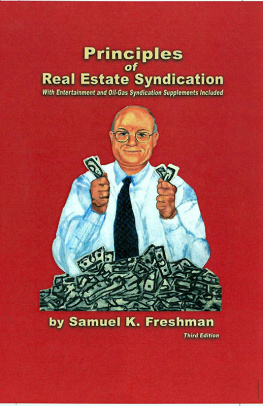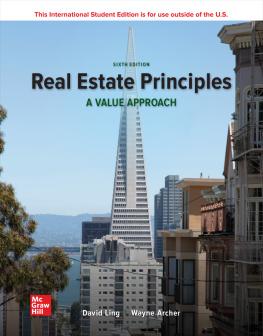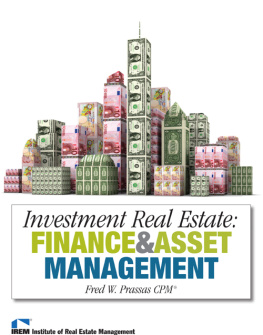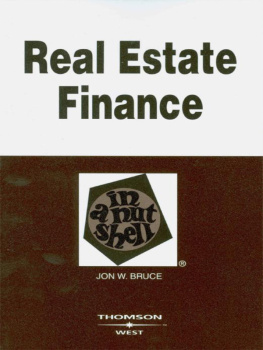Samuel K. Freshman - Principles of Real Estate Syndication
Here you can read online Samuel K. Freshman - Principles of Real Estate Syndication full text of the book (entire story) in english for free. Download pdf and epub, get meaning, cover and reviews about this ebook. year: 2014, publisher: BookBaby, genre: Romance novel. Description of the work, (preface) as well as reviews are available. Best literature library LitArk.com created for fans of good reading and offers a wide selection of genres:
Romance novel
Science fiction
Adventure
Detective
Science
History
Home and family
Prose
Art
Politics
Computer
Non-fiction
Religion
Business
Children
Humor
Choose a favorite category and find really read worthwhile books. Enjoy immersion in the world of imagination, feel the emotions of the characters or learn something new for yourself, make an fascinating discovery.
- Book:Principles of Real Estate Syndication
- Author:
- Publisher:BookBaby
- Genre:
- Year:2014
- Rating:5 / 5
- Favourites:Add to favourites
- Your mark:
Principles of Real Estate Syndication: summary, description and annotation
We offer to read an annotation, description, summary or preface (depends on what the author of the book "Principles of Real Estate Syndication" wrote himself). If you haven't found the necessary information about the book — write in the comments, we will try to find it.
50,000 copies of earlier editions of this book have been sold. This work is a how to do it book with definitive easy to understand thinking on real estate syndication theory and practice with excellent examples and illustrations which can be applied to any type of business enterprise including Entertainment, Oil and Gas, Timber, Agricultural, Manufacturing, Restaurant, Venture Capital, Import and Export, and all other kinds of industries. THE AUTHOR Samuel Freshman has long distinguished himself in the legal and real estate field. He is a past Chairman of the Legal and Accounting Committee of the California Real Estate Association Syndication Division. He has lectured extensively on the subjects of real estate syndication, finance and law before Realty Boards, Bar Associations, CPA Societies, Colleges and Universities. Mr. Freshman assisted in the preparation of both the California Corporation and Real Estate Commissioners syndicate regulations. He is a partner in numerous real estate investments. He is a graduate of Stanford University and Stanford University Law School. In 1958 he founded and became the senior partner of a prestigious Los Angeles law firm. In 1962 Sam formed Standard Management Company which has sponsored hundreds of millions of dollars of investments in real estate projects throughout the U.S.A. An author of many Articles on Syndication and real estate, he has qualified numerous times as an expert witness on real estate and finance in both the federal and state courts. Principles of Real Estate Syndication contains 22 chapters covering such vital matters as: What is Syndication?, Types of Syndications, Why Syndicate Interests are Purchased, Syndication Leverage, Syndication Risks and Responsibilities, Advantages and Disadvantages of Syndication, Syndication Motivation and Profit Formulas, Selecting What to Syndicate, Syndicating Cash to Loan, Syndicating for All Cash, How to Acquire Property, The Profits Agreement, Sources of property, How to prepare an agreement for Purchase and Sale of Property, Leverage Techniques, Selecting the Entity, Tax Considerations, Preparation of the Partnership Agreement, Licensing and Regulation of Syndication Activities, Finders Fees and Brokerage Commissions, How to Market Syndicate Shares, and Providing Liquidity for Syndicate Interests. The work also contains extensive glossaries of real estate, entertainment, and oil and gas terms as well as an Appendix of applicable rules, regulations and forms.
Samuel K. Freshman: author's other books
Who wrote Principles of Real Estate Syndication? Find out the surname, the name of the author of the book and a list of all author's works by series.














